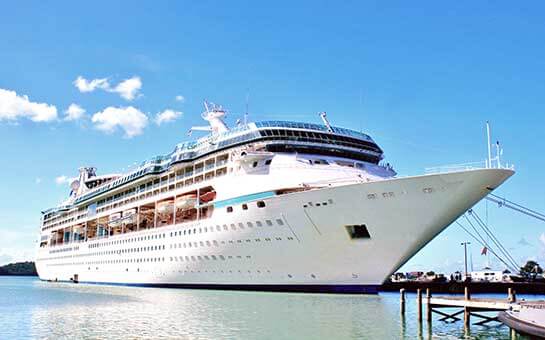What to Look for in a Cruise Travel Insurance Policy
Cruise travel insurance safeguards your dream vacation from unexpected disruptions and expenses, whether you're setting off for a relaxing beach escape or an adventure-filled journey. Cruises come with unique risks—from missed flights and delays to on-board health emergencies. The right insurance policy ensures you're covered at every stage of your trip, helping you avoid financial losses if things don’t go as planned. With coverage tailored to cruise travelers, you can relax and enjoy, knowing that common issues like cancellations, itinerary changes, and medical emergencies are fully handled.
Compare Plans from Top Cruise Insurance Providers
Our platform helps you find the perfect combination of trip interruption, medical, and cancellation coverage tailored to your needs. With options ranging from standard to premium packages, you’ll discover the ideal plan with the right coverage levels and benefits for a worry-free cruise experience.
Overview
Cancel for Any Reason and Interruption for Any Reason is offered as an optional coverage.
Overview
Optional coverages include Cancel for Any Reason, 24 hour AD&D, Interruption for Any Reason, Trip Delay Max, and Additional Medical Expense.
Overview
What Does Cruise Travel Insurance Cover?
A comprehensive cruise travel insurance policy includes several types of coverage, each designed to handle specific risks and incidents that could disrupt your trip. Here’s a breakdown of the most important coverages you should consider:
Trip Cancellation Insurance
Trip cancellation insurance reimburses you if unexpected events—such as illness, injury, family emergencies, job loss, or legal obligations—require you to cancel, protecting the investment you’ve made in your trip.
Medical Evacuation Coverage
Medical evacuation from a cruise can be costly, especially if specialized care is needed. With medical evacuation coverage, you’ll be transported to the nearest suitable facility in an emergency without the high costs. It's recommended to select a policy with at least $250,000 in coverage.
Emergency Medical Coverage
Cruise insurance typically includes emergency medical coverage for unexpected healthcare costs during your trip, which is vital as most health plans don’t cover international travel. This coverage ensures you can access care—from doctor visits to hospital stays and emergency dental treatment—whether at sea or in port.
Weather-Related Cancellations
Weather-related cancellation coverage reimburses you if storms or severe weather disrupt your cruise plans. Most policies must be purchased before a storm is named, so plan ahead to ensure full benefits.
Trip Interruption Coverage
If you must end your cruise early due to an emergency, trip interruption coverage reimburses unused trip costs and may cover additional transportation expenses to get you back home. This type of coverage can reimburse you up to 200% of your trip’s value to cover unexpected expenses, making it an essential part of any comprehensive policy.
Travel Delay and Missed Connections
Travel delay coverage helps cover meals, accommodations, and transport costs if you face long delays, missed flights, or tight connections. For extra protection, look for policies that also include missed connection coverage when traveling to your cruise.
Cruise Travel Insurance Tips and FAQs
Selecting the right cruise travel insurance policy doesn’t have to be confusing. Here are answers to some common questions about cruise insurance:
How Much Does Cruise Insurance Cost?
Cruise insurance costs vary based on factors such as trip length, destination, and the coverage amount selected. Typically, policies range from 4-10% of your total trip cost, with more comprehensive coverage options at higher price points.
Is Cruise Travel Insurance Worth It?
Cruise travel insurance is highly recommended because of the unique risks associated with cruises, including health emergencies at sea, unpredictable weather, and travel delays. Having coverage helps ensure that your investment is protected, no matter what.
Do I Need Travel Medical Insurance for My Cruise?
Most domestic health plans, including Medicare, don’t provide coverage outside your home country, making travel medical insurance essential. A cruise insurance policy with emergency medical benefits helps you access healthcare services abroad without facing high out-of-pocket costs.
When Should I Purchase Insurance for My Cruise?
It’s best to purchase cruise travel insurance as soon as you book your trip. Buying early maximizes coverage, including protection for pre-existing conditions and cancellations due to unexpected events occurring before your departure.
Can I Cancel My Cruise Last Minute?
Most policies offer coverage for last-minute cancellations under specific conditions, such as illness or family emergencies. Check your policy’s terms to understand what qualifies for reimbursement and consider "Cancel for Any Reason" add-ons for maximum flexibility.
Does Insurance Cover Cruise Excursions?
Some plans cover off-ship excursions, though this may vary by provider. Be sure to review your policy’s details or add excursion insurance for complete protection on all parts of your adventure.
Get instant quotes for this plan and purchase today!
Can't find answers to your questions?
Ask our specialists - Licensed and experienced insurance professionals in the U.S.

